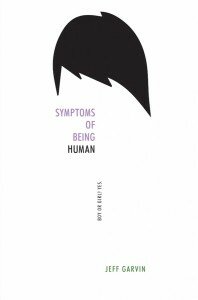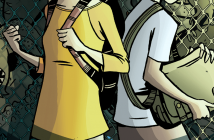 “We’re all taught from a young age that there are only two choices: pink or blue, Bratz or Power Rangers, cheerleading or football. We see gender in two dimensions because that’s what society has taught us from birth. But, are you ready for a shocking revelation? SOCIETY NEEDS TO CHANGE.”
“We’re all taught from a young age that there are only two choices: pink or blue, Bratz or Power Rangers, cheerleading or football. We see gender in two dimensions because that’s what society has taught us from birth. But, are you ready for a shocking revelation? SOCIETY NEEDS TO CHANGE.”
Jeff Garvin’s incredible debut Symptoms of Being Human follows Riley, a gender-fluid teenager who begins an anonymous blog at the suggestion of a therapist. When the blog goes viral and somebody threatens to reveal Riley’s identity, Riley must make a choice: to walk away from the blog, or come out to friends and family.
The seed for Symptoms of Being Human came to Garvin in the form of a local news story, after a transgender girl in his county sued the school district for the right to use the girl’s locker room – and won. After three days of thinking about it, and getting into a heated discussion about the story, Garvin knew he had to write about it.
“As far as I can tell, the internet has transformed what it means to be a teenager. Now, you can be Tumblr famous without anyone knowing your real name. But on the flip side, you can be cyber-bullied in your own bedroom. Teenagers today have anonymity, but very little privacy. It’s a strange dichotomy. I honestly don’t know how I would’ve dealt with that in high school. I hope I would’ve reacted the way Riley does in Symptoms of Being Human — but I’ll never know.”
Garvin – who identifies as cisgender, having identified with the gender identity he was assigned at birth – kept Symptoms of Being Human as close to a realistic experience as possible. That involved Riley being bullied – scenes Garvin considered a necessary part of Riley’s story and an unfortunate reflection of reality – and Riley seeing a therapist.
“I didn’t actually decide to have Riley see a therapist; Doctor Ann just sort of showed up on the page and started asking challenging questions. She made me think and she made me laugh, and she kept returning at key points in the novel. As I look back with an analytical eye, I suppose Doctor Ann acts as a mentor to Riley, a sort of mental health Jedi who helps Riley to realize their own strengths, and shows them how to leverage those strengths for healing. [In real life], a good therapist can help you sort through your thoughts and decide which ones are worth keeping around and which ones you’re better off releasing. I love therapy and highly recommend it.”
Garvin refers to Riley as they or them when speaking and interviews, but Riley uses no pronouns whatsoever in Symptoms of Being Human. (Alex Gino, author of the middle grade novel George, recently wrote a post about their use of they/them pronouns, for those interested in reading more.) Garvin felt the use of they/them would draw more attention to the question of Riley’s birth-assigned gender.
“I wanted people to focus on Riley’s humanity and struggle, so I decided to avoid pronouns altogether,” said Garvin. “It definitely affected my writing style. Though I’d always planned to write Symptoms in the first person, I think eschewing pronouns would’ve been impossible in any other POV. The hardest parts to write were dialogue scenes in which other characters talk about Riley; I had to avoid third-person pronouns without sounding unnatural.
“It’s important to point out that [in real life], most gender fluid people can’t avoid gendered pronouns—they’re everywhere. But it’s equally worth noting that many languages are gender fluid, including Tagalog (Philippines), which uses the same word, siya, to mean he and she. Some native Tagalog speakers have trouble adapting to using gendered pronouns when they learn English. My point: language is a powerful tool for shaping thoughts. So, if a nonbinary person asks you to address them using a pronoun that seems unnatural or awkward to you, honor their request! The awkwardness will pass, your friend will feel respected, and you’ll have taken a significant step toward rewiring your brain and the brains of those with whom you speak.”
Despite Garvin’s best efforts, some discussion around Symptoms of Being Human focuses on Riley’s assigned gender, with some reviewers insisting on using a gendered pronoun for Riley or wondering why readers never discover what Riley’s assigned gender is – misunderstand, of course, the entire gender-fluid identity.
But Garvin has advice for those who don’t quite understand.
“First: Do some reading. Learn why Biological Sex, Gender Identity, and Gender Expression are three distinct concepts. The genderbread person is a great place to start. I also wrote a thing. Second: Take the time to reckon with your own gender identity—which, if you’re a cisperson like me, you’ve likely never had to do. Write about it, just for yourself—or share it if you like. Third: Be respectful with your curiosity.”
Symptoms of Being Human is available tomorrow.
“We’ve talked a lot about gender identity, and there’s no doubt it’s an important part of the book,” said Garvin. “But at its heart, Symptoms of Being Human is about reckoning with what it means to be a person. Tangling with our insistent hearts. Battling inner darkness. Recognizing our tendency to marginalize what we don’t understand. Suffering the consequences of our penchant for small pink candies. You know, the usual life stuff.”
For more on Garvin, visit his website or follow him on .


2 Comments
Pingback: OFFICAL SYMPTOMS BLOG TOUR » JEFF GARVIN
Pingback: 8 YA books to watch out for in February 2016 - YA Interrobang